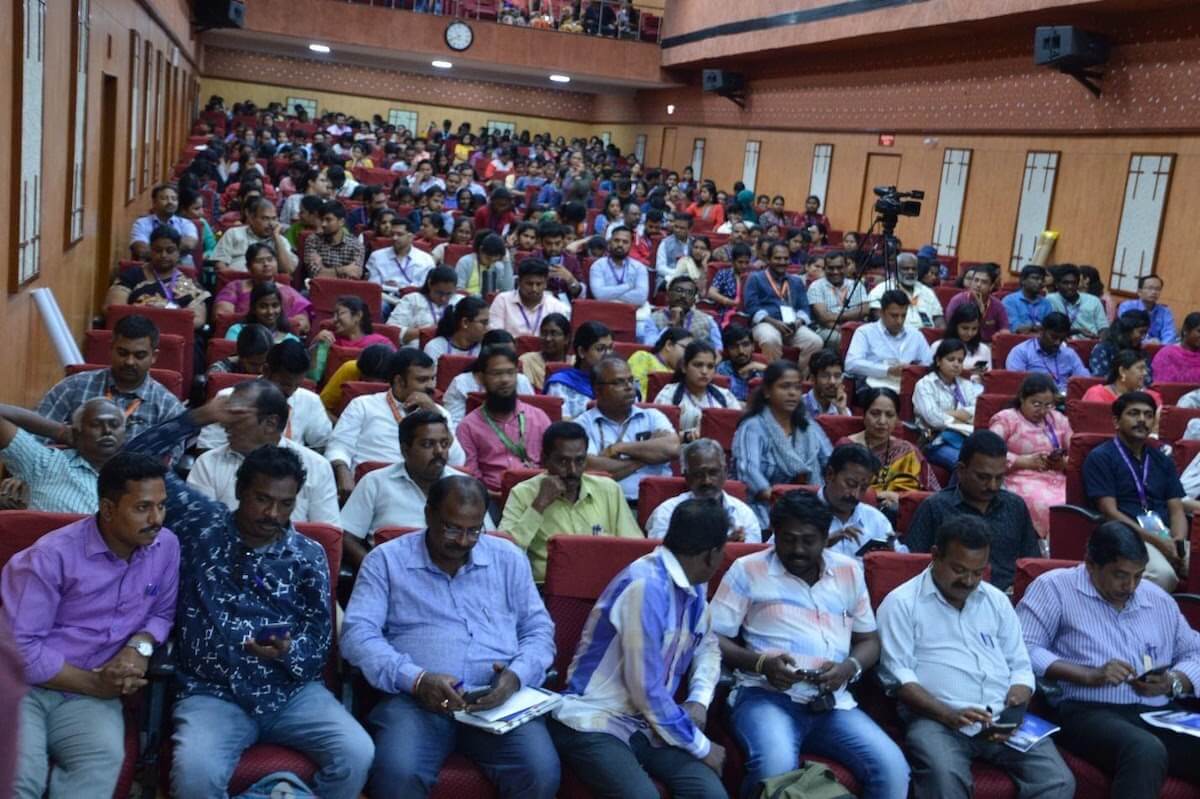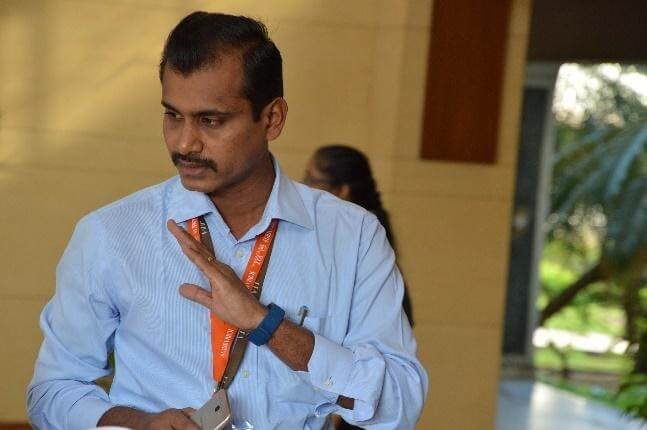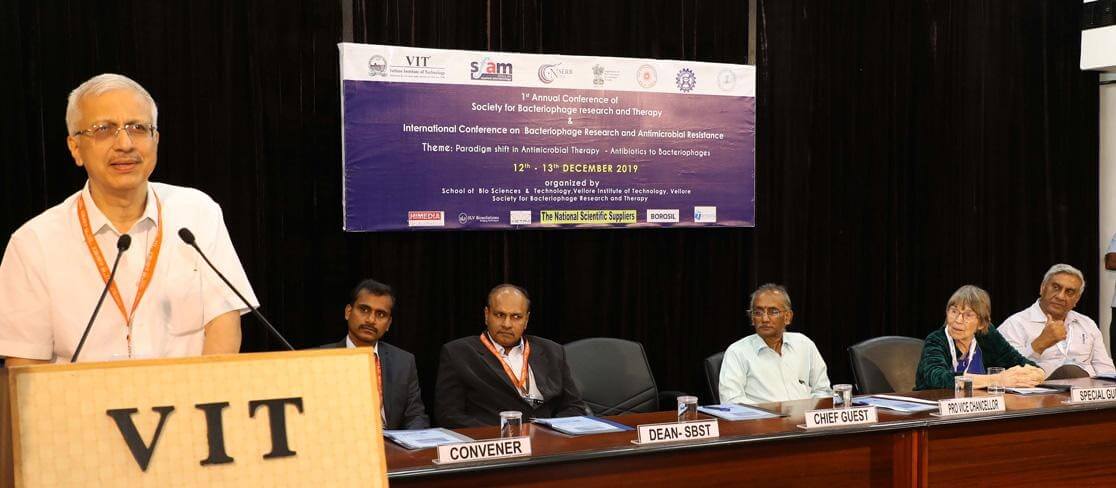Conference theme: Paradigm shift in Antimicrobial therapy – Antibiotics to Bacteriophages.
Convener: Dr. N. Ramesh, Assistant Professor, SBST, VIT Vellore
A two day-long International conference on Bacteriophage Research and Antimicrobial Resistance (ICBRAMR ’19) was recently held at the Vellore Institute of Technology (VIT), Vellore, Tamilnadu.
The conference was organized jointly by the School of Bio Sciences and Technology (SBST), VIT in association with Society for Bacteriophage Research and Therapy (SBRT), India.
Highlighting the recent trends in antimicrobial resistance and the search for alternative treatment options, the chief guest Dr. Srikanth Prasad Tripathy, Director-in-charge, ICMR-National Institute of Research in Tuberculosis, Chennai and the special guest Prof. Elizabeth Kutter, the “First Lady of Phage Research” and Professor Emeritus, Evergreen State College, Olympia, USA, urged the scientific community to work tirelessly to discover a new weapon to combat the challenging antimicrobial resistance.
Dr. V Pragasam, Dean of the School of Bio Sciences and Technology, VIT, welcomed the gathering. Prof. Sanjay Chhibber, President, Society for Bacteriophage Research and Therapy introduced the Society and its function to the participants and other dignitaries. Dr. S. Narayanan, Pro Vice Chancellor, VIT introduced VIT and talked about the achievements and accolades of the institute. The conference souvenir was released and the guests planted a tree to end the inaugural session of the event.
The conference had keynote lectures by 20 renowned speakers who spoke on the latest developments in the field of Bacteriophage research and Antimicrobial resistance and around 300 participants across the globe had the opportunity to interact and share their experiences with the speakers.

ICBRAMR ’19 participants.
Conference at a glance
Prof. Kutter delivered the first lecture on “Bacteriophages: Biology and Applications”. She started with a brief introduction on T4 phage and about usage of bacteriophages in treating patients infected with multidrug resistant bacteria and pan drug resistant bacteria at the Eliava Institute, Tbilisi, Georgia.
Phage therapy is not approved for human use in most countries, including India, and conclusive evidence through clinical studies is urgently needed to convince the scientific community and clinicians in India to practice phage therapy. Prof. Chhibber, President, SBRT and Professor at Panjab University presented his findings on “From Concept to Product: Challenges at various stages in creating a successful and commercially viable phage preparation for therapeutic applications”. Prof. Gopal Nath, Secretary, SBRT and Professor at Banaras Hindu University gave a lecture on “Preclinical and Clinical Bacteriophage Therapy” where he shared a few case studies of patients with diabetic ulcers and bacteremia.
Prof. Vinod Kumar, Vice President, SBRT also delivered a keynote lecture on “Building a future with bacteriophage; an alternative protagonist”. While finishing his lecture, he said that the regulatory authorities and the end users should encourage building the future with phage as an antibacterial agent in therapies since the impact of antibiotics is fading.
Dr. Mark Toleman from the School of Medicine, Cardiff University, UK, who has extensive knowledge on antimicrobial resistance, particularly in the Asian region, delivered an effective lecture on “Controlling resistance in E. coli” outlining the genetic diversity of E. coli in UK and India and the natural role of phages in controlling MLST E. coli and its prevalence. Considering the widespread existence of improper usage of antibiotics, the next keynote lecture was delivered by Dr. Ashok J Tamhankar from Karolinska Institutet, Sweden on the “Global scenario of antimicrobial resistance”.
Dr. Balaji V, Dr Joy Sarojini Michael and Dr. Biju George from Christian Medical College, Vellore talked about the surveillance systems, antibiotic resistance profiling in both Gram-positive and Gram-negative bacteria among the Indian population, TB prevalence and diagnosis, and the problems associated with MDR bacteria in the process of transplantation, respectively. Dr. C P Girish Kumar from National Institute of Epidemiology, Chennai also discussed the prevalence of antibiotic resistance in Gram-negative bacteria in India.
Dr. Sebastian Leptihn, Zhejiang University, ZJU-UoE INSTITUTE, China shared his data on “Filamentous Phage Biology and their Impact on Human Health” and Dr. Urmi Bajpai from Acharya Narendra Dev College, New Delhi gave a lecture on “A Multipronged Quest for Anti-Mycobacterial Solution: Bacteriophages, Endolysins and Small Molecules”.
Mr. Pranav Johri, who was the first person to receive phage therapy from India, shared his success story with the participants, and through video conference, Dr. Jeremy Barr from Monash University, Australia shared the well-known story of phage therapy for Tom Patterson, who battled an MDR Acinetobacter baumannii infection.
The conference also had talks from industry experts like Dr. Aradhna Vipra from Gangagen Biotech, Bengaluru, who talked about phage product development for non-clinical applications “From Laboratory to Field”. Dr Manavi Dang and Dr Devjani De from Dang’s Lab in Gurgaon, Haryana, discussed “Turning the Tables on MDROs”, highlighting the importance of Film Array for the early detection of antibiotic escalation in ICU patients.
We also had an enlightening lecture from a different perspective by Dr. Taruna Anand, who discussed the isolation and characterization of phages for bovine infections.
Prof. Graham Hatfull from the University of Pittsburgh presented how his SEA-PHAGES program helped in treating a 15-year-old girl suffering from a drug-resistant mycobacterial infection.
Finally, we had Dr. Prasanth Manohar, who obtained his PhD under my guidance, and who is now a postdoc at ZJU-UoE Institute, China, spoke on the topic of “Antimicrobial Resistance and Phage Therapy: Our Research Lab at VIT”, giving an overview of the extensive work carried out during his Ph.D. at VIT.
Poster presenters were awarded during the valedictory ceremony.
About the conference
This conference aimed at bringing together Indian and international communities working in the field of Bacteriophage and AMR to discuss new and exciting advances in the field. This conference was enlightened by the words and experience shared by the 7 international keynote speakers from USA, UK, Sweden, Australia and China and 14 national keynote speakers from 8 states. A total of 60 institutes, 10 states and 2 union Territories from India and 2 international participants from Vietnam and UK registered for this conference.

Dr. N. Ramesh, Assistant Professor and Convener, ICBRAMR ’19.
We were really blessed and fortunate to have Prof. Elizabeth Kutter, the First Lady of Phage Research, at our conference. Her knowledge, wisdom and experience was a real bonus for the participants who had the chance to meet and interact with her. She is definitely a role model for the young researchers, as she at the age of 80 is still active and enthusiastic in leading phage research and therapy around the world. She has been involved in phage therapy at the Eliava Institute, Tbilisi, Georgia, where patients with chronic bacterial infections get treated with phages.
Highlights of the conference
The conference has set a platform for the people working on phages from India, and the level and diversity of discussion was just outstanding.
- Concerns were raised about the problem of potentially low phage retention at the site of infection when administered. Prof. Chhibber explained through his findings how phages can be retained at the site of infection by a suitable lipid-based delivery system.
- The release of endotoxin due to bacterial lysis places another limitation on phage treatment, and questions were raised on the purity of the phages being administered to the patients. Dr. Jeremy Barr’s talk had an answer, and through his publication in PeerJ journal, an optimized protocol to clean phage preparations prior to the administration of phages clinically. He also shared how this preparation saved Tom Patterson, who recovered from his MDR Acinetobacter baumannii infection.
- The conference also had Mr. Pranav Johri, who presented how he is helping patients from India get access to phage therapy, and also shared that more than 60 patients have received phage therapy in India through his Vitalis Phage Therapy initiative.
- Issues raised repeatedly on how to design clinical trials that adequately assess both phage therapy’s safety and efficacy and what type of regulations were followed in India regarding phage therapy for the timely approval to deliver phages to patients who need it
- Prof. Vinod Kumar emphasized that although no dedicated regulatory mechanisms exists for phage therapy in India, still consent from two doctors who are treating multidrug resistant infections along with some forms from the Drug Controller General of India (DCGI) is required.
- Nearly all of the panelists emphasized that along with phages there must be appropriate use of current medications. They also stressed the use of phages as an adjuvant for antibiotics.
- The conference participants also had the opportunity to learn how complex pathogens like mycobacteria can be targeted by mycobacteriophages through a video lecture by Prof. Hatfull. He also explained how phages can be engineered to be more efficacious in the treatment.
Several participants asserted that new drugs were also needed to treat infections caused by Gram-negative and Gram-positive pathogens, and they all agreed in unison that phage therapy is a possible solution.
I think even though we have a lot of phages, or we appear to have a fairly large group of phage scientists right now, let’s not be so complacent about that. Bacteria are too smart.







